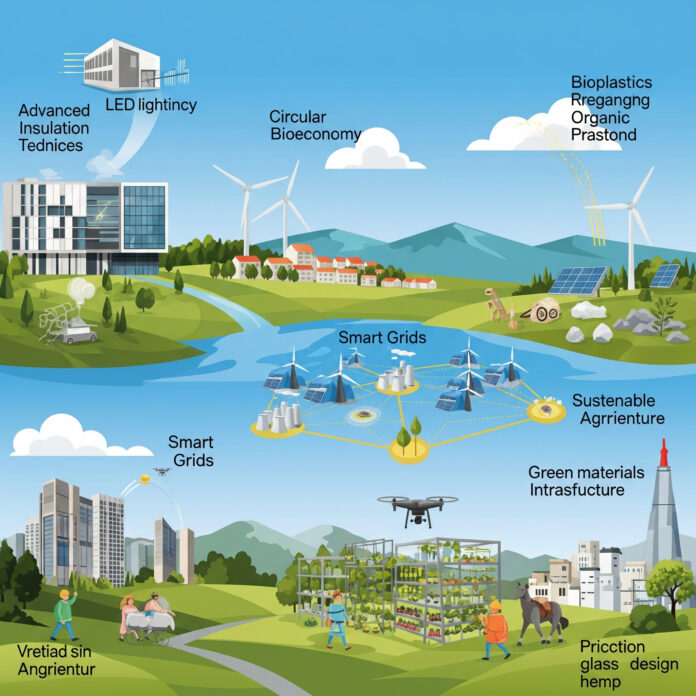GLOBAL INNOVATION HUBS – July 17, 2025 – The global push for sustainability is driving an unprecedented wave of technological innovation, transforming everything from how we power our homes to how we build our cities and grow our food. Recent advancements highlight a future where efficiency, circularity, and environmental responsibility are at the core of technological progress.
India Leads in Energy Efficiency: India is at the forefront of the energy efficiency revolution, particularly in the domestic sector. Significant strides have been made, with modern air conditioners now consuming an impressive 80% less energy than units from 2000. This dramatic reduction is a direct result of stringent regulatory frameworks, such as proposed mandates for higher thermostat settings and incentives for scrapping older, less efficient units, coupled with rapid technological advancements in appliance design and manufacturing.
Circular Bioeconomy: Waste to Wealth: The concept of a circular bioeconomy is rapidly gaining traction, transforming waste into valuable resources and creating entirely new sustainable value chains. Cutting-edge waste-to-resource technologies, including advanced gasification and anaerobic digestion, are converting organic waste into energy and usable materials. Furthermore, innovations in insect biotechnology, such as the use of Black Soldier Fly larvae, are providing sustainable solutions for biofuel production and waste management, effectively closing resource loops.
Advanced Renewables Redefine Energy Landscape: The renewable energy sector is seeing transformative breakthroughs. Perovskite solar cells are emerging as a game-changer, boasting significantly higher efficiencies and lower manufacturing costs compared to traditional silicon panels. This promises more affordable and widespread solar adoption. Concurrently, the deployment of floating offshore wind turbines is expanding renewable energy generation to deeper ocean waters, unlocking vast, previously inaccessible wind resources and enhancing global clean energy capacity.
Smarter Grids and Diverse Energy Storage: Power grids are becoming increasingly intelligent, with advanced sensors and data analytics optimizing electricity distribution and minimizing waste. Crucially, innovative energy storage solutions are emerging to complement intermittent renewable sources. Beyond traditional batteries, new methods leveraging principles of gravity, compressed air, and even molten salt are being developed to store energy on a larger scale and for longer durations, ensuring stable and reliable power supply.
Sustainable Agriculture for a Greener Future: Farming practices are being revolutionized by sustainable technologies. Precision agriculture, powered by the Internet of Things (IoT), drones, and Artificial Intelligence (AI), enables farmers to monitor crop conditions with unprecedented accuracy. This leads to optimized resource management, drastically reducing water, fertilizer, and pesticide use while maximizing yields. The development and widespread adoption of biopesticides are further minimizing the environmental impact of farming, promoting healthier ecosystems and food production.
Green Materials Building a Sustainable Tomorrow: The construction industry is also undergoing a significant green transformation with the development of more sustainable building materials. Innovations include carbon-negative concrete, which actively absorbs carbon dioxide from the atmosphere during its curing process, and materials like hempcrete and mycelium-based composites that offer eco-friendly alternatives with reduced environmental footprints. These advancements are crucial for constructing resilient and environmentally responsible infrastructure.
These ongoing technological advancements are not only mitigating environmental impact but also creating new economic opportunities, fostering innovation, and driving the global transition towards a more sustainable and resource-efficient future.





